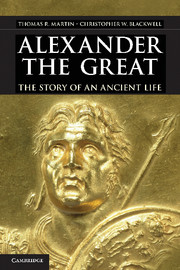Book contents
- Frontmatter
- Contents
- Acknowledgments
- Introduction: The Goal of this Book
- Map 1: European Greece, Macedonia, and Northern Lands
- Map 2: Alexander's Expedition
- 1 The World of Alexander's Birth and His Education in Literature and Warfare (350s and 340s BC)
- 2 Opportunities and Risks asa Teenager (340s to 338 BC)
- 3 The Danger in Replacing a Murdered Father as King (337 to 335 BC)
- 4 The Opening Battles Against the Persian Army (334 to 332 BC)
- 5 Finding God in Egypt and Capturing the Riches of Persia (332 to 330 BC)
- 6 Winning the World as King of Asia (330 to 329 BC)
- 7 Murder, Marriage, and Mixing Customs in Afghanistan (329 to 327 BC)
- 8 Victory and Frustration in India (327 to 326 BC)
- 9 Returning to Babylon and Becoming Divine (326 to 323 BC)
- 10 Remembering and Judging Alexander (323 BC to Now)
- Suggested Readings
- Index
9 - Returning to Babylon and Becoming Divine (326 to 323 BC)
Published online by Cambridge University Press: 05 November 2012
- Frontmatter
- Contents
- Acknowledgments
- Introduction: The Goal of this Book
- Map 1: European Greece, Macedonia, and Northern Lands
- Map 2: Alexander's Expedition
- 1 The World of Alexander's Birth and His Education in Literature and Warfare (350s and 340s BC)
- 2 Opportunities and Risks asa Teenager (340s to 338 BC)
- 3 The Danger in Replacing a Murdered Father as King (337 to 335 BC)
- 4 The Opening Battles Against the Persian Army (334 to 332 BC)
- 5 Finding God in Egypt and Capturing the Riches of Persia (332 to 330 BC)
- 6 Winning the World as King of Asia (330 to 329 BC)
- 7 Murder, Marriage, and Mixing Customs in Afghanistan (329 to 327 BC)
- 8 Victory and Frustration in India (327 to 326 BC)
- 9 Returning to Babylon and Becoming Divine (326 to 323 BC)
- 10 Remembering and Judging Alexander (323 BC to Now)
- Suggested Readings
- Index
Summary
Alexander had dreamed of surpassing Dionysus and Heracles by continuing into the unexplored (by Greeks) east until he had encircled the world. Now he had turned away from the dream. The pain of this failure was vivid. Still, he marched south along the Indus River, reaching one extreme limit of the terrestrial world at Pattala at the upper end of the Indus Delta. Pattala's inhabitants had fled, but Alexander persuaded them to return to their town and help him defend it against neighboring tribes. He ordered construction of a harbor and a fortified citadel and wells and irrigation in the countryside to support more productive farming. Alexander was governing the strip of India that he covered, following his vision of empire. He relied more than ever on local leaders, while also still placing Macedonians in positions of command. His most important Indian ally was Porus, and Alexander worked to strengthen this former opponent's rule, to extend his territory, and to ensure his ability to govern as a loyal and powerful ally.
While navigating his way through the confusing tangle of waterways of the delta running to the Indian Ocean, Alexander lost several ships in the treacherous currents and tides. At the edge of the sub-continent, he performed the sacrifices that Ammon in Egypt had prescribed to mark his success on reaching Ocean. He then sailed out to sea and sacrificed to Poseidon, the god of the seas, just as he had done ten years earlier when crossing the Hellespont into Asia. He poured an offering of wine into the water and threw in the golden cup after it, praying that the god grant his fleet a safe return to Mesopotamia. He returned to the delta and ordered a second harbor constructed, the infrastructure for sustained commerce by sea between India and his empire to the west. He wanted travelers and merchants to have an alternative to the laborious and expensive overland trip.
- Type
- Chapter
- Information
- Alexander the GreatThe Story of an Ancient Life, pp. 149 - 166Publisher: Cambridge University PressPrint publication year: 2012



